 W
WAcanthaclisinae is a subfamily of Myrmeleontidae, the antlions. It comprises a single tribe, Acanthaclisini, which has about 221 species in 16 genera.
 W
WAleuropteryginae is a subfamily of lacewing.
 W
WArgiolestinae is a subfamily of damselflies. They belong to the flatwing damselfly family, Argiolestidae. Like their relatives but unlike damselflies of other families, they usually spread their hindwings horizontally when resting. It is the largest subfamily in Argiolestidae, making up almost three-quarters of the family's species, found primarily in Australia, New Guinea, and New Caledonia.
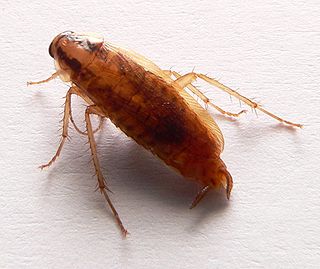 W
WBlattellinae is a subfamily of the cockroach family Ectobiidae. It includes the global household pest Blattella germanica, the German cockroach, but also a number of species that are known to be endangered. It contains about 70 genera.
 W
WBlattidae is a cockroach family in the order Blattodea containing several of the most common household cockroaches. Some notable species include:Blatta orientalis: Oriental cockroach, Common shining cockroach: Florida woods cockroach: Periplaneta spp: American cockroach, Australian cockroach, Brown cockroach, Smokybrown cockroach Shelfordella spp: Turkestan cockroach Botany Bay cockroach:
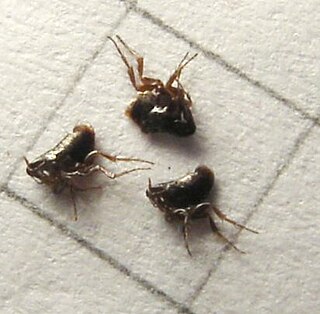 W
WCeratophyllidae is a family of fleas. Its members are parasites of mainly rodents and birds. It contains two subfamilies, one containing over 40 genera, and the other just three.
 W
WFishflies are members of the subfamily Chauliodinae, belonging to the megalopteran family Corydalidae. They are most easily distinguished from their closest relatives, dobsonflies, by the jaws (mandibles) and antennae. In contrast to the large jaws of dobsonflies, fishfly mandibles are not particularly noticeable or distinctive, and the males have feathery antennae similar to many large moths. Chauliodes pectinicornis, the "summer fishfly", is a well-known species in North America.
 W
WChrysopinae is a subfamily of green lacewings in the insect family Chrysopidae in the order Neuroptera. They are the nominate taxon and largest member of the green lacewing family (Chrysopidae), containing about 60 genera.
 W
WCeratophyllidae is a family of fleas. Its members are parasites of mainly rodents and birds. It contains two subfamilies, one containing over 40 genera, and the other just three.
 W
WElicinae is a subfamily of tropiduchid planthoppers in the family Tropiduchidae.
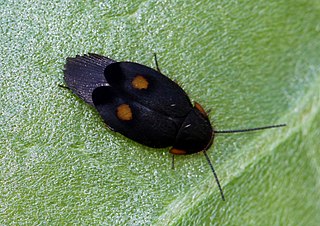 W
WEuthyrrhapha is a genus of sand cockroaches in the family Corydiidae. It is the only genus in the subfamily Euthyrrhaphinae.
 W
WHolocompsa is a genus of hairy sand cockroaches in the family Corydiidae. It is the only genus in the subfamily Holocompsinae.
 W
WThe Idolothripinae are a subfamily of thrips, with about 82 genera.
 W
WIsoperlinae is a subfamily in the family Perlodidae, also known as the perlodid stoneflies, stripetails or springflies.
 W
WMicrominae is a subfamily of neuropteran insects of the family Hemerobiidae.
 W
WMyrmeleontinae is a subfamily of Myrmeleontidae, the antlions.
 W
WPalparinae is an antlion subfamily in the family Myrmeleontidae.
 W
WCorydiidae, previously known as Polyphagidae, is a family of the order Blattodea (cockroaches). Many are known as sand cockroaches. The family is divided into five subfamilies, comprising some 40 genera. One prominent species is the desert cockroach, Arenivaga investigata.
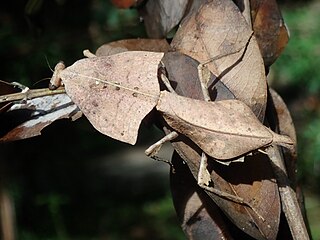 W
WThe Deroplatyidae are a new (2019) family of praying mantises, based on the type genus Deroplatys. As part of a major revision of mantis taxonomy, the subfamily Deroplatyinae has been moved here from the previously-structured family Mantidae.
 W
WSalyavatinae are a subfamily of the assassin bugs. They have a pan-tropical distribution with about 16 genera. They have two foretarsal segments and have a patch of fine hairs known as the fossula spongiosa on the fore and mid tibia. Many species tend to have spines on the head, pronotum, legs and abdomen. A few species have the foretibia flattened into leaf-like structures.Acosmetocoris Miller, 1954 Alvilla Stål, 1874 Araneaster Hesse, 1925 Elaphocranus Bergroth, 1904 Eudima Schouteden, 1912 Lisarda Stål, 1859 Paralisarda Miller, 1957 Petalocheirus Palisot de Beauvois, 1805 Platychiria Herrich-Schäffer, 1850 Rhachicephala Truong, Zhao & Cai, 2007 Rulandus Distant, 1904 Salyavata Amyot & Audinet-Serville, 1843 Syberna Stål, 1874 Tragelaphodes Bergroth, 1904 Tritavus Hesse, 1925 Valentia Stål, 1865
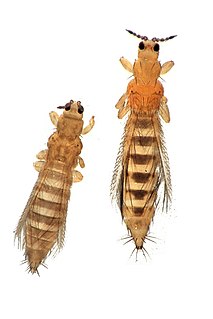 W
WThe Thripinae are a subfamily of thrips, insects of the order Thysanoptera. The Thripinae belong to the common thrips family Thripidae and include around 1,400 species in 150 genera. A 2012 molecular phylogeny found that the Thripinae was paraphyletic; further work will be needed to clarify the relationships within the group.
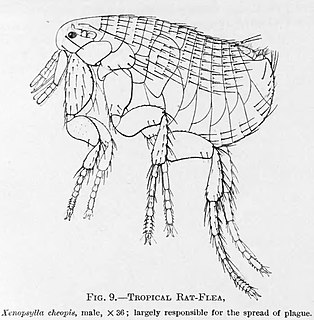 W
WThe Xenopsyllinae form a flea subfamily in the family Pulicidae.